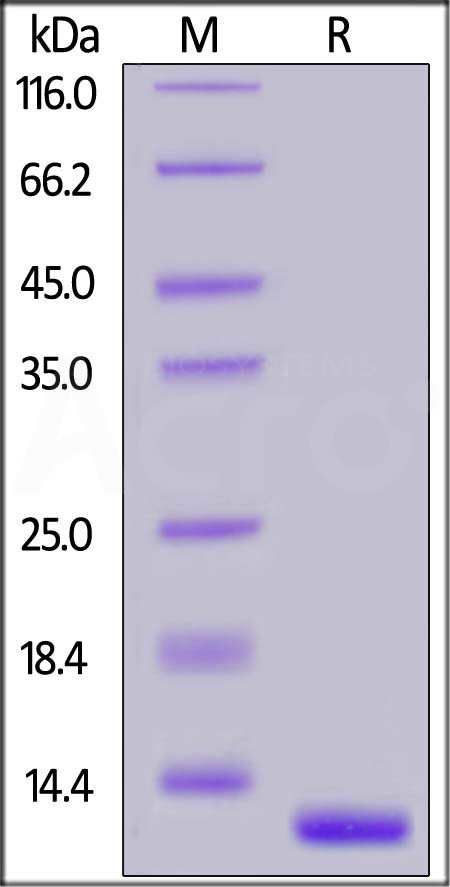分子别名(Synonym)
TGFB2,MGC116892,TGFβ2,TGF-beta2
表达区间及表达系统(Source)
Human TGF-Beta 2, Tag Free (TG2-H4215) is expressed from human 293 cells (HEK293). It contains AA Ala 303 - Ser 414 (Accession # P61812-1).
Predicted N-terminus: Ala 303
Request for sequence
蛋白结构(Molecular Characterization)

This protein carries no "tag".
The protein has a calculated MW of 12.7 kDa. The protein migrates as 23-25 kDa when calibrated against Star Ribbon Pre-stained Protein Marker under non-reducing (NR) condition (SDS-PAGE) due to glycosylation.
内毒素(Endotoxin)
Less than 1.0 EU per μg by the LAL method.
纯度(Purity)
>95% as determined by SDS-PAGE.
制剂(Formulation)
Lyophilized from 0.22 μm filtered solution in TFA and ACN with trehalose as protectant.
Contact us for customized product form or formulation.
重构方法(Reconstitution)
Please see Certificate of Analysis for specific instructions.
For best performance, we strongly recommend you to follow the reconstitution protocol provided in the CoA.
存储(Storage)
For long term storage, the product should be stored at lyophilized state at -20°C or lower.
Please avoid repeated freeze-thaw cycles.
This product is stable after storage at:
- -20°C to -70°C for 12 months in lyophilized state;
- -70°C for 3 months under sterile conditions after reconstitution.
电泳(SDS-PAGE)

Human TGF-Beta 2, Tag Free on SDS-PAGE under non-reducing (NR) condition. The gel was stained with Coomassie Blue. The purity of the protein is greater than 95% (With Star Ribbon Pre-stained Protein Marker).
活性(Bioactivity)-BLI

Loaded Human TGFBR2, Fc Tag (Cat. No. TG2-H5252) on Protein A Biosensor, can bind Human TGF-Beta 2, Tag Free (Cat. No. TG2-H4215) with an affinity constant of 8.09 nM as determined in BLI assay (ForteBio Octet Red96e) (QC tested).
Protocol
背景(Background)
Transforming growth factor beta 2 ( TGFB2) is also known as TGF-β2, G-TSF, TGFB. is a polypeptide member of the transforming growth factor beta superfamily of cytokines. It is a secreted protein that performs many cellular functions, including the control of cell growth, cell proliferation, cell differentiation and apoptosis. The TGFB2 protein helps control the growth and division (proliferation) of cells, the process by which cells mature to carry out specific functions (differentiation), cell movement (motility), and the self-destruction of cells (apoptosis). The TGFB2 protein can inhibit the T cell growth by IL-2-dependent. and can inhibit immune surveillance during tumor development, the protein promoting tumor growth with an autocrine manner. TGF-β2 can affect the viability of killer cells and reduce the expression of IL-2, IL-6, IL-10, IFN-γ and other cytokines.TGFB2 plays an important role in controlling the immune system, and shows different activities on different types of cell, or cells at different developmental stages.























































 膜杰作
膜杰作 Star Staining
Star Staining













